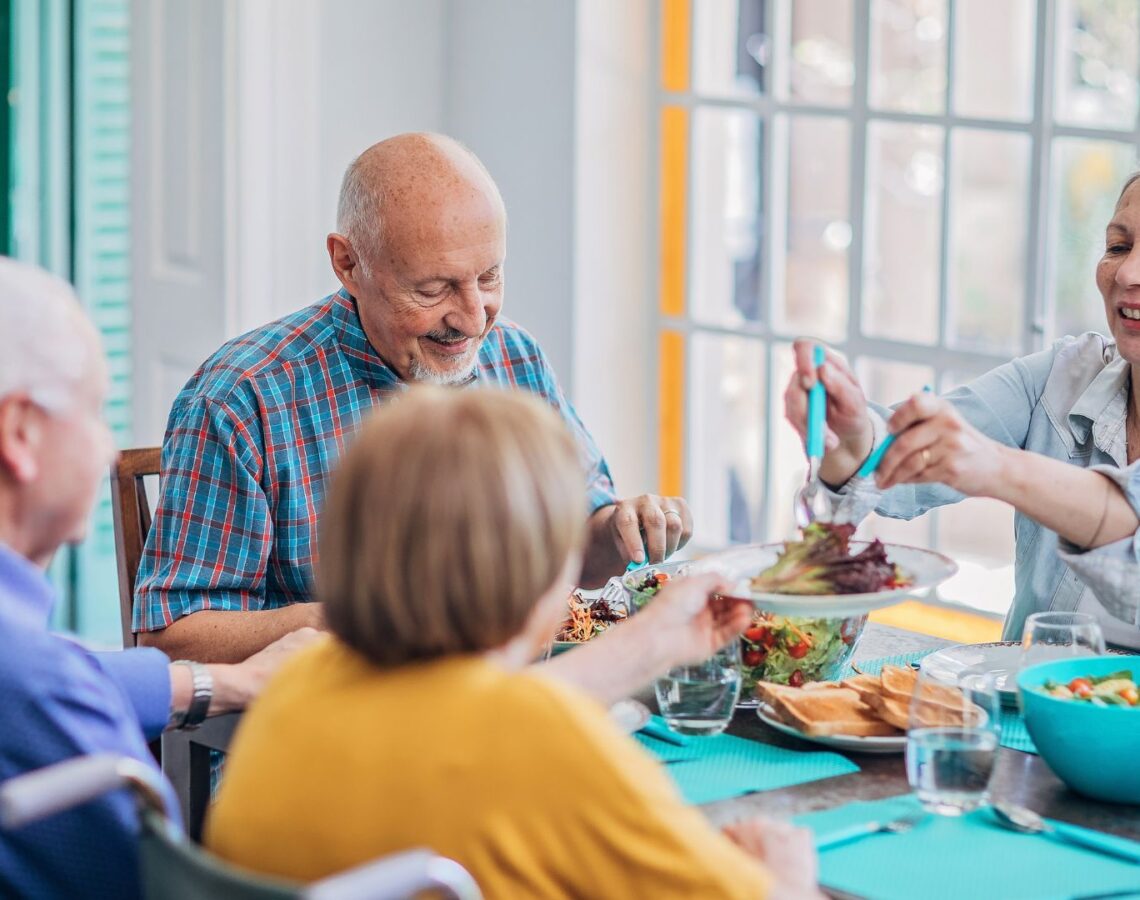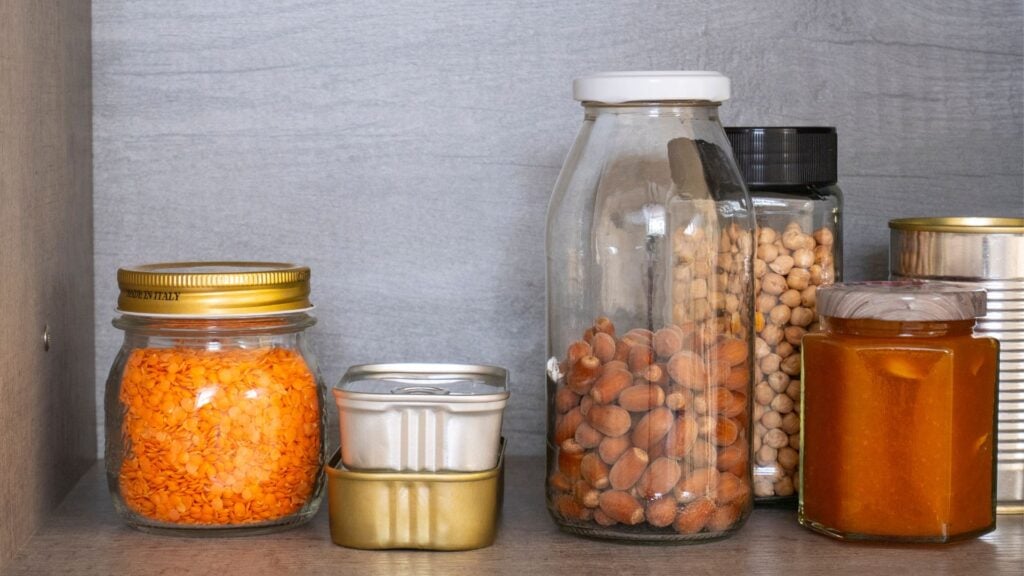No appetite? Nutrition tips for older adults to support long term health

Discover how nutrition needs change as we age and find great ideas for what to eat and drink to stay healthy, maintain bone health, and what to do if you, or someone you care for, has no appetite.
Nutrition changes as we age
As we age, our eating habits naturally evolve. Sometimes this is due to changes in appetite, reduced mobility making shopping and cooking more challenging, or simply adjusting to cooking meals for 1 or 2 people. On top of this, the rising cost of food and living can also shape what we eat and how often.
Understanding these changes can help us address our nutritional needs as we age, enjoy mealtimes and support a good quality of life for ourselves and those we care for.
Firstly, it’s important to eat a range of foods each day to get everything our body needs. We can do this by simply choosing a variety of foods from each of the 5 food groups:1
- Meat and alternatives: meat, chicken, fish, eggs, beans, lentils, legumes, nuts, seeds
- Dairy and alternatives: cow’s milk, yoghurt and cheese, or non-dairy alternatives (choose options fortified with at least 100mg of calcium per 100mL)
- Vegetables: Fresh, frozen or canned (choose reduced-sodium options)
- Fruit: Fresh, frozen or canned in 100% fruit juice, or dried fruit (in small amounts)
- Grain (cereal) foods: Bread (all types), rice, pasta, noodles, oats, wholegrain breakfast cereals, crispbreads, quinoa, polenta.

How to maintain bone health?
As we get older, our bones may lose some strength and become more fragile/prone to injury, but there’s plenty we can do to keep them as strong as possible (for as long as possible). Eating foods rich in key vitamins and minerals as well as staying active can make a big difference. One of the most important minerals for bone health is calcium2, which helps to keep our bones strong, so it’s important to eat calcium-rich foods regularly. Try to eat or drink calcium-rich foods throughout the day. Serves vary depending on your age and other factors, view the recommended number of serves. An example of 1 serve is:
- a cup (250mL) of cow’s milk or plant-based milk fortified with calcium
- a tub of yoghurt (200g) or a cup of custard
- two slices of cheese (40g)
- half a cup of tinned fish with bones (salmon or sardines).
Vitamin D helps our body absorb calcium more easily and our body produces vitamin D when exposed to sunlight.3 In Australia, it is important to remain sun safe while enjoying the outdoors! Most Australians get enough vitamin D while doing everyday outdoor tasks (like hanging up the washing), and by including foods high in vitamin D, like oily fish or eggs. If you’re unsure about your vitamin D levels, talk to your GP about if vitamin D supplement may be helpful.
Another great way to maintain bone health as we age is including weight-bearing and balance activities. These activities help reduce bone loss and keep our muscles strong; strong muscles and bones are important to reduce the risk of falls. If you have a medical condition, check with your GP or physiotherapist before starting any new exercises.
Try these physical activities:
- Weight-bearing activities like carrying groceries, walking, and going up stairs
- Balance activities like standing on your toes, Thai Chi, walking and standing on one leg

What to do if I have no appetite?
Sometimes our body’s natural hunger signs may change, whether due to illness, grief, or simply getting older. When we experience a loss of appetite, enjoying our usual meals, or even taking the time to eat, can be challenging. Even when food holds little appeal, it’s important to stay hydrated and eat enough food for our bodies to recover and give us energy.
If the lack of appetite is due to sickness, eating healthy foods can help the immune system fight off the illness. A lack of food can delay recovery and even make us feel tired and fatigued.
On top of this, not getting enough water and other fluids through the day can lead to dehydration, which increases our fatigue. When we’re unwell our bodies can lose even more fluid, through sweating, a fever or vomiting, so replacing these fluids is a must!
The best way to ensure we’re staying well hydrated is to drink enough water (try for 8-10 cups a day). This, along with eating nutritious food (including plenty of fruits and vegetables), will ensure you are getting all the fluids and nutrients you need.
There’s no need to serve big portions or force yourself to cook the usual meals when not feeling hungry. Keep it simple and go for small amounts of healthy, high-energy food and drinks regularly throughout the day.
When feeling up to it, some gentle exercise can help to stimulate your appetite. This could simply be a walk around the garden, or some stretches in the living room.
Try these ideas to boost your energy when you have no appetite:
- Eat nutritious foods such as yoghurt, cheese or bread/English muffins/crumpets with nourishing toppings like avocado, cottage/ricotta cheese, or nut butters
- Drink milk-based drinks such as plain and flavoured milk or smoothies
- Have 6 smaller meals/snacks across the day instead of 3 larger meals.
Weight loss can occur if your poor appetite continues, so weigh yourself regularly to check and see a doctor if weight loss continues or if you’re not able to regain weight when eating normally again. This is general advice only; please consult a health professional if you are concerned about your appetite, intake and weight.
By eating and drinking from the 5 food groups and increasing our physical activity, we can promote a healthier, more vibrant life in our later years. Remember, even small steps toward healthier habits and movement can make a difference in maintaining our appetite, bone health and energy as we age.
Sources:
- Australian Government, National Health and Medical Research Council. (2013). Australian Guide to Healthy Eating. https://www.eatforhealth.gov.au/guidelines/australian-guide-healthy-eating
- Healthy Bones Australia (2025) Your Bone Health: Calcium. https://healthybonesaustralia.org.au/your-bone-health/calcium/
- Gunville CF, Mourani PM, Ginde AA. The role of vitamin D in prevention and treatment of infection. Inflamm Allergy Drug Targets. 2013;12(4):239-245. doi:10.2174/18715281113129990046
Acknowledgement
This content has been developed by Health and Wellbeing Queensland’s team of nutritionists, dieticians and exercise physiologists. Always visit your healthcare professional for dietary advice tailored to your circumstances.


